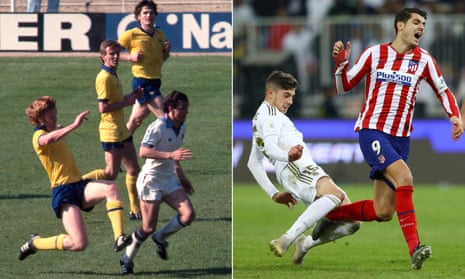When Atlético Madrid striker Álvaro Morata raced through on goal with a few minutes to play in the Spanish Supercopa final, the Real Madrid midfielder Federico Valverde knew what he had to do. Football constantly changes, but there is always room for classic shithousery. “It was something that I should not have done,” said Valverde. “I apologised to Morata, but it was the only thing I could do because he’s a very fast player.”
Valverde’s tackle may not have been in the spirit of fair play, but it worked out well for his team. He was sent off immediately but, by taking out Morata, he helped his teammates stay in the game and play for penalties. Real Madrid went on to win the shootout and Atlético were left wondering what might have been. Not that their manager blamed Valverde. “I told him that he did what he had to do at that moment,” said Diego Simeone after the game.
Valverde’s lunging challenge brought to mind a similarly cynical foul made 40 years ago in an FA Cup final. That tackle denied a young player the chance to score a famous goal at Wembley and it also led to a change in the laws of the game that still stands today.
The 1980 FA Cup final was not going to script. West Ham, who were in the Second Division at the time, had taken an early lead through a rare Trevor Brooking header and Arsenal – who had seen off the might of Liverpool after four gruelling matches in the semi-finals – simply ran out of ideas. Then came the chance for West Ham to kill the game and add one last dollop of feelgood factor to the plot.
As an exhausted Arsenal side – playing their 67th match of the season – pushed for an unlikely equaliser, West Ham’s 17-year-old midfielder Paul Allen found himself through on goal with just Pat Jennings to beat. Allen, the youngest player to have played in the FA Cup final at the time, was about to complete his footballing fairytale. Yet Willie Young had other ideas.
Young had formed a fine centre-back partnership with David O’Leary at Arsenal, yet it would be fair to describe the hulking Scot as an uncompromising defender. And, as Allen raced towards the Arsenal goal in the 87th minute, Young chose to demonstrate his approach to the game.
“Paul was put through, about 20 yards outside the box,” recalled Young in Jon Spurling’s fine book Rebels for the Cause. “I had a split second to make up my mind. Either he would have most probably scored, or I had the chance to at least keep us in with a shout. So I thought: ‘Son, you’ve gotta go.’ I was a defender and I defended. It wasn’t a brutal foul. I just tapped his foot and he went down. Paul was very good about it and said: ‘I’d have done the same, big man.’ I never lost any sleep over it.”
Arsenal fan Nick Hornby wrote in Fever Pitch that, even though he was embarrassed by the tackle as he stood on the Wembley terraces, “part of me actually enjoyed the foul”. “It was so comically, parodically Arsenalesque. Who else but an Arsenal defender would have clattered a tiny 17-year-old member of the academy?”
Whereas the laws of the game compelled the referee to dismiss Valverde on Sunday night, no such punishment existed in 1980. The referee at Wembley, George Courtney, merely awarded West Ham a free-kick and booked Young. In doing so, he opened a national debate. The meek punishment added credence to the idea that football needed a professional foul law.
Although most newspaper reports concentrated on West Ham’s victory and Brooking’s rare headed goal, they all referenced Young’s challenge. Some backed him, arguing that it was the law rather than the defender who was to blame. Others called the foul blatant, callous and cynical. Jeff Powell said it had created a “sour memory” for the watching world. “As long as professional fouls pay off, they will be committed,” noted the Mail’s comment section.
David Lacey wrote in the Guardian: “The Football Association may consider it worthwhile informing referees of their full support should they decide next season to dismiss those who commit such cynical, squalid fouls, for which yellow cards and free-kicks are inadequate punishments.”
When the Football League subsequently appointed a committee to consider ways of making football more entertaining – with Jimmy Hill chairing the discussion and both Matt Busby and Bobby Charlton asked for their opinions – they suggested that players committing professional fouls should be sent off. The law was introduced two years later. The change was obviously made to deter calculating defenders but, as Valverde showed, there is still room in the sport for pure cynicism. At least he ended up on the winning team. Young didn’t even have that consolation.

Comments (…)
Sign in or create your Guardian account to join the discussion